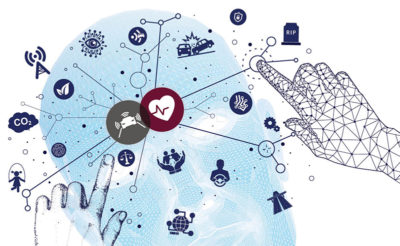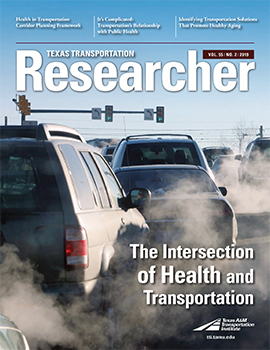Convenience Culture? How About Compassion Culture?
I’m a big fan of science fiction (SF) — old standards like The Twilight Zone and Star Wars, and newer classics-to-be like the Marvel movies. One reason I enjoy SF so much is that the genre often uses its fantastic landscapes and far-out circumstances to present, in stark relief, what it means to be human. “For your consideration,” as Rod Serling used to say.
If you drew a Venn diagram of health and transportation, much of the overlap would be positive — when we travel for work or leisure, or to get the kids to school or visit the doctor. But there are cases of negative overlap, too: respiratory diseases exacerbated by air pollution, vehicle crashes causing injuries and death, and an overreliance on single vehicles, which can encourage illnesses like diabetes.

Mitigating the negatives with advanced transportation technologies can sometimes feel like we’re dabbling in science fiction. And while some experts claim connected and automated vehicles can reduce traffic deaths (currently hovering around 35,000 a year) by as much as 80 percent, that ambitious future is still coming into focus.
Today, though, it’s worth reiterating that humans — you and I — are still the central factor in the health-transportation equation. A common SF theme examines how the more reliant we become on technology, the more like that tech — cold and distant, dehumanized — we can become if we’re not careful. Sometimes, the technology we create even decides it’s better off without us. Enter Arnold Schwarzenegger’s cyborg, programmed to exterminate humans by Skynet, in The Terminator.
Not so long ago, folks took better care of one another than we seem to today. When your nearest neighbor was 20 miles and a few hours away by horseback, being neighborly was more than a nod to courtesy. It was a survival strategy. We depended on one another to weather natural catastrophes, and you can still see this selfless spirit captured in the newsfeed today when disaster strikes. But it sometimes takes a Hurricane Harvey or a California wildfire to bring it out.
As we race through daily life, let’s remember that we’re all — every one of us — responsible for the consequences when health intersects with transportation. A safety culture isn’t just about practicing safe driving behaviors; it’s also about caring for one another — even if we’re only 20 feet, not 20 miles, apart. It’s about courtesy and consideration for others even absent bad weather.
We don’t need a new policy to tell us how to act toward one another. We already know how. So, the next time you’re on the road, consider prioritizing compassion over convenience. Invest some goodwill toward others in the karmic bank of the universe. Remember that what goes around comes around.
Everything we do matters. Everything we do counts. And sometimes selflessness can, ironically, be in our own self-interest.
